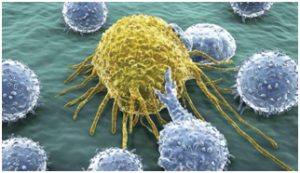Scientists studying cancer treatment are optimistic that new approaches involving immunotherapy will be more effective than radiation.

Dr. Marcel Hernandez, ND
The scientists are studying ways to improve the cancer-defending ability of the body’s T-cells.
T-cells are a type of white blood cell that specializes in finding and destroying unwelcome foreign invaders such as bacteria, viruses, fungi, and cancer. The T-cells are the body’s heroic first defense against cancer – so, the more T-cells the better.
The T-cells are covered with finger-like receptors that enable them to identify cells that threaten the body. The following microphotograph shows T-cells latching onto a cancer cell in preparation for attacking it:

When our immune system is functioning properly, the T-cell receptors can call upon reinforcements to help defend the body. The T-cell soldiers then latch onto the invader cells and make holes through which they shoot toxic granules, neutralizing the threat.
Unfortunately, there are only a few T-cell types that can identify and destroy cancer cells. But the FDA recently approved three new immunotherapy drugs, called PD-1 inhibitors, that help the T-cells overcome the cancer cells’ defenses and keep destroying the cells indefinitely.
Cancer cells attack the body’s T-cell defenses by producing a protein that limits a substance in the T-cells called programmed cell death protein 1 (PD-1), thus turning off the T‑cells. The new drugs bind to PD-1 and prevent the cancer cells from curtailing T-cell production. And more T-cells means more cancer fighters.
Jonathan Cheng, executive director of clinical oncology at Merck, said:
“Chemotherapy almost always stops working. The promise of immune therapy is that you’re training the immune system [itself] to attack something foreign, so you are able to maintain that activity for a very long time, hopefully for the rest of the patient’s life.”
Sounds promising. Will there be unwelcome side effects of the new drugs? None have been discovered so far, and clinical trials with cancer patients are underway.
Read more about T-cells HERE.






Speak Your Mind
You must be logged in to post a comment.